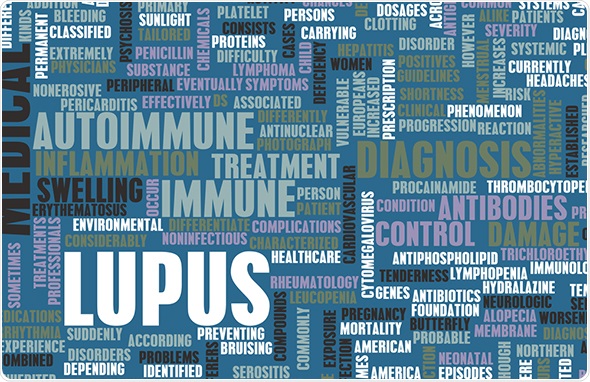Lupus is a chronic, autoimmune disease, with many different symptoms so it is hard to diagnose.
It affects each person differently and it has an unpredictable disease course with flare ups and quiet time.
Some patients describe lupus as if they are riding a roller coaster with blinders on because they cannot always tell when they will feel well or sick.
Lupus is a lifelong disease that causes inflammation of major organs which can lead to damage of the skin, joints, kidneys, lungs, or brain.
The some of the symptoms of lupus include redness or rash across the nose which may be shaped like a butterfly, painful or swollen joints, sores in the mouth or nose, chest pain while taking deep breaths, swelling in the legs and ankles which could reflect kidney problems, unexplained hair loss, low blood counts, sensitivity to the sun, unexplained fever, seizures, pregnancy problems, heart attacks or strokes.
Some symptoms are hard to detect like extreme fatigue or weakness or body aching or difficulty thinking which the person feels but cannot be easily seen by friends, co-workers, family or caregivers and cannot be detected by a blood, urine, or an imaging test.
If someone has three or more of these symptoms then the person should talk with their doctor about lupus.
Why does lupus predominantly affect women?
Lupus can start in a person at any time, but 90 percent of the people living with lupus are women. Women of color are at the highest risk for getting lupus.
The sex hormone estrogen plays a role in lupus. Both men and women produce estrogen, but women make more estrogen than men.
Some women have more lupus symptoms before menstrual periods and/or during pregnancy, when estrogen production is high.
This may indicate that estrogen somehow regulates or modulates the severity of lupus. However, it does not mean that estrogen causes lupus.
What factors can trigger a lupus flare?
Every person with lupus is different. There is a genetic predisposition to lupus, but it is likely that a combination of many genes (not only one gene) plus some kind of environmental trigger to trigger lupus for the first time or to bring on a flare in those with established disease.
Examples of possible environmental triggers include: sun exposure, an infection, exhaustion, an injury, emotional stress, or anything that causes stress to the body, such as surgery, physical harm, pregnancy, or giving birth.
These triggers are not present for everyone and many times we cannot pinpoint what caused the flare.
How much is currently know about the causes of lupus?
The factors that contribute to flare likely contribute to the causes of lupus. At this time, we do not know what causes lupus, but many researchers are working hard to discover why someone gets lupus and how to treat the person with lupus.
 Shutterstock.com / kentoh
Shutterstock.com / kentoh
What are the most common misconceptions about lupus?
Lupus is not contagious, so you cannot give it to anyone nor do you catch it from anyone.
Lupus is not cancer or HIV/AIDs.
Lupus can affect anyone, any age, and race or ethnicity.
Lupus can be disabling and potentially fatal, but many persons with lupus can be managed through medical treatment and lifestyle changes.
What do you think needs to be done to help counteract these misconceptions and raise awareness of lupus?
Education and advocacy are key strategies to counter misconception and improve awareness of lupus.
Educating both persons affected by lupus and their families as well as healthcare providers especially those on the frontlines such as primary care providers, emergency room physicians, community clinics, etc. will counteract the misconceptions and provide accurate the accurate information needed about this disease.
Advocacy by working with the organizations that support patients and research such as the Lupus Foundation of America and the Lupus Research Alliance (merger of the Lupus Research Institute, Alliance for Lupus Research and the SLE Lupus Foundation), both national and affiliate.
What treatments are currently available for lupus?
There is no cure for lupus, but there are effective treatments. However, many people with lupus can have a full and rewarding life with the help of doctors, a good support system, and lifestyle changes.
Physicians treat lupus using a wide variety of medicines, ranging in strength from mild to extremely strong.
There are many categories of drugs physicians use to treat lupus. However, the U.S. Food and Drug Administration or “FDA” has approved only a few specifically for lupus, which include: Corticosteroids, including prednisone, prednisolone, methylprednisolone, and hydrocortisone; Antimalarials, such as hydroxychloroquine (Plaquenil®) and chloroquine; the monoclonal antibody belimumab (Benlysta®); and aspirin.
For more severe lupus, or when internal organs are affected, stronger prescription immunosuppressive drugs are prescribed to quiet the immune system and protect organs such as the kidneys, heart, and lungs from further attack.
Please can you outline your research into creating new lupus therapies?
My clinical research program examines risk factors to minimize complications related to SLE including osteoporosis, malignancy, and cardiovascular disease.
Through national and international collaborations, I have studied genetic risk factors for disease severity and susceptibility in SLE; collaborated on studies to investigate the pathogenesis of disease; developed lupus disease classification criteria, flare assessment, nephritis guidelines, biomarkers for diagnosis, and assessed health-related outcomes such as fatigue and quality of life.
I am directing a new initiative to address health disparities in Chicago. Pertinent to the development of new therapies, I have experience designing, monitoring (participation on Data Safety Monitoring Boards, DSMBs) and performing clinical trials identifying novel biomarkers and testing innovative therapies for patients with SLE.
Developing new therapies
- Panel member to revise classification criteria for lupus which will help increase recruitment for clinical trials
- Part of study team to define flares in patients with lupus
- Panel member to develop guidelines to diagnose and treat lupus kidney disease.
- Site investigator for biomarker development for diagnosis of lupus and as potential predictors for lupus flare
Risk factors for the complications of lupus
- Demonstrate the increased risk of fractures in patients with lupus
- Indicate a possible link between bone deterioration and cardiovascular disease in lupus
- Refine risk estimates for cancer risk in lupus patients
- Collaborate with investigators to identify genes that may increase the risk of developing renal disease and those that may go on to develop end-stage renal failure
- Perform physical activity assessments as a first step to understanding the multiple factors contributing to fatigue experienced by patients with lupus
- Document for the first time that abnormalities in imaging the carotid blood vessels in lupus patients predicts their future risk of developing a stroke or heart attack
- Demonstrate associations between gene expression profiles and cardiovascular disease progression among lupus patients
- Documented the relationship between Vitamin D and markers of subclinical cardiovascular disease in women with lupus
- Showed that telomere length as a marker of aging is seen in lupus patients compared to healthy controls
- Documented that pregnancy complications such as pre-eclampsia might be a risk factor for subsequent development of cardiovascular disease in women with lupus
Health Disparities
- Show that young African-American women with lupus have the same risk of osteoporosis as Caucasian women
- Discover that African-American women with lupus have the same risk of having abnormal imaging in blood vessels as Caucasian women, which indicates an increased risk of cardiovascular disease
What do you think the future holds for patients with lupus?
The most important message is one of hope. Even though only one new medication has been approved for use specifically in lupus patients in over 50 years, I believe we are on the horizon of seeing new discoveries that will likely need to new treatments for lupus in the next five years.
We are refining all of our current treatments and working on better detection tools to prevent flares and to minimize complications of lupus. All investigators agree that minimizing damage is one of the treat to target goals of our management strategies.
Where can readers find more information?
Lupus Research Institute
330 Seventh Avenue, Suite 1701
New York, NY 10001
T: 212.812.9881
http://lupusresearchinstitute.org
Lupus Foundation of America, Inc.
2000 L Street, N.W., Suite 410
Washington, DC 20036 T: 202.349.1155
http://www.lupus.org/
Alliance for Lupus Research
28 West 44th Street, Suite 501
New York, NY 10036
T: 212-218-2840
www.lupusresearch.org
Education/Research Website for Dr. Ramsey-Goldman
http://www.lupus.northwestern.edu
Professor Ramsey-Goldman, MD
Professor Ramsey-Goldman, MD is a practicing clinical rheumatologist and an NIH funded investigator interested in epidemiology of systemic lupus erythematosus, (SLE, lupus) with more than 28 years of personal experience performing clinical research in SLE.
Her leadership positions include: medical director for the Clinical Research Unit for the Northwestern University Clinical and Translational Science (NUCATS) Institute and the co-director of the clinical research track for the rheumatology fellowship and associate director for the Multidisciplinary Clinical Research Center in rheumatology at Northwestern University Feinberg School of Medicine in the Division of Rheumatology.
Her national service includes a three year term as the Chair of the Committee on Education for the American College of Rheumatology and on the Board of Directors for the American College of Rheumatology.
Currently, she serves on the editorial board of Arthritis and Rheumatism and on the Scientific Advisory Counsel for the Rheumatology Research Foundation. She is the author of 191 peer reviewed and 69 invited publications.